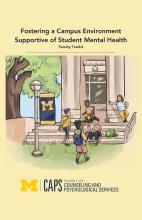Students at the University of Michigan may experience a wide range of mental health issues during the course of their academic experience. As faculty members, teaching assistants, or staff members in academic departments, you may encounter students who need mental health support. Your role can be a positive and crucial one in identifying students who are in distress and assisting them to find the resources available to help.
Faculty Toolkit
In the Fall of 2019, CAPS launched the Faculty Toolkit with the generous support of the Baldwin Foundation. The toolkit was distributed to each faculty member in all 19 schools/colleges in order to provide the tools needed to better help support college student mental health. The toolkit was developed collaboratively with the CAPS Student Advisory Board, CAPS Project Manager, Student Illustrator and the CAPS Outreach Committee.
Making A Referral To CAPS
A referral to CAPS should be considered when you believe a student's problems go beyond your own experience and expertise, or when you feel uncomfortable helping a student with some issue. A referral may be made either because of the way the student's problems are interfering with their academic work or with your teaching, or because observation of the student's personal behavior raises concerns apart from his or her academic work.
Quick Tips for Reaching Out to a Student
- Talk to the student in private when both of you have time and are not rushed.
- Listen to thoughts and feelings in a sensitive, non-threatening way.
- Express your concern in specific nonjudgmental terms that reflect your concern for the well being of the student.
- Let the student know that you believe a consultation with a staff member at CAPS could be helpful.
Consultation Services
Consultation Services For Student Concerns
Often, you as a staff or faculty person will be one of the first persons to find out that a student is having personal problems that are interfering with their academic success or daily lives. The student may come to you for academic advising, or visit during office hours, send you an email, etc. and share personal concerns with you.
Concerns About Student's Writing
Faculty and instructional staff are often the first to have access to students’ ways of thinking and acting. If a student’s writing seems disturbing, it’s natural for an instructor to want to respond. But an immediate or impulsive reaction may exacerbate the problem by isolating and alienating the student. Many students who hand in disturbing material would never act on the thoughts that they have put on paper. Conversely, many students act violently with no prior indication.








